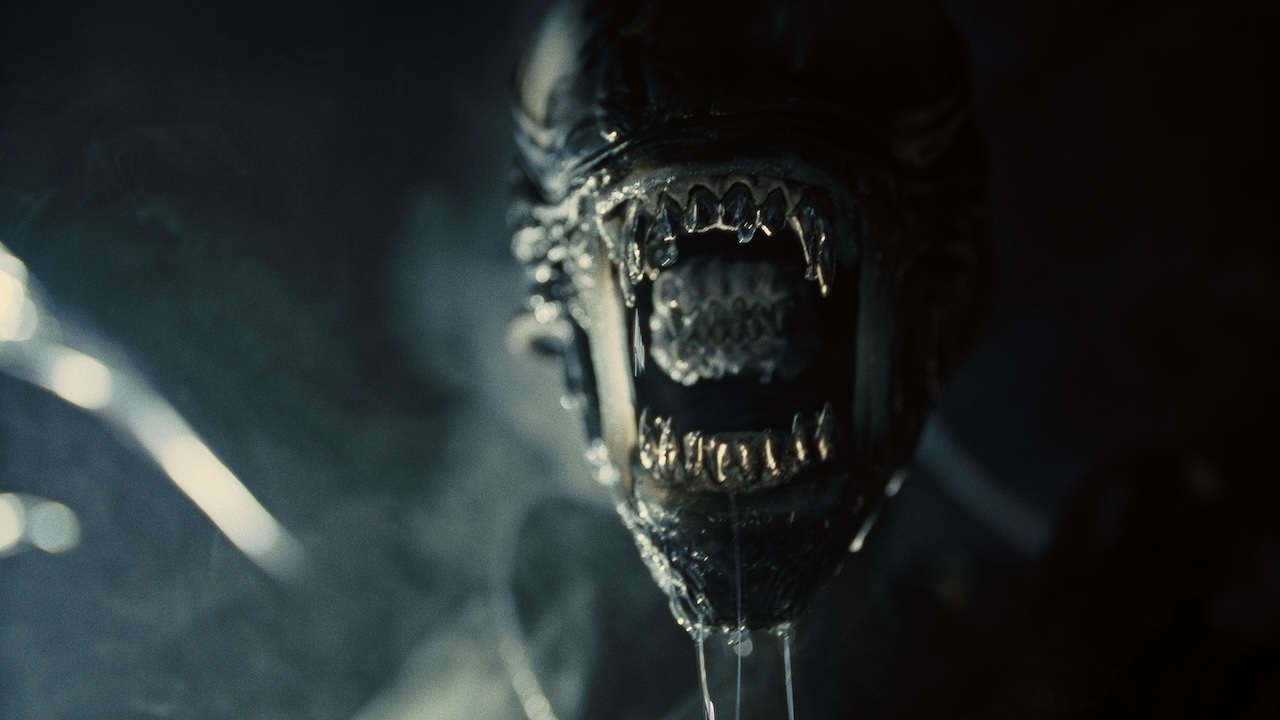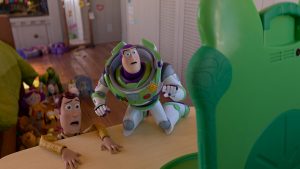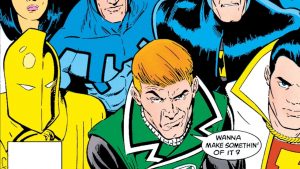
This post contains major spoilers for Alien: Romulus.
It all comes down to Ash—or whatever he is called these days. If the duplicitous android/science officer aboard hadn’t overridden Ripley’s (Sigourney Weaver) security protocols and allowed the infected Kane (John Hurt) aboard the Nostromo in the original Alien, none of this would have ever happened.
So it makes a certain amount of sense that Ash, one of the Alien franchise’s most insidious monsters, would return in Fede Alvarez’s Alien: Romulus, a movie the director co-wrote with Rodo Sayagues. After all, the new film is determined to tie the whole franchise together, and with the sinister android’s pseudo return comes information that changes the entire saga, fully connecting the mainline films to the prequels Prometheus and Alien: Covenant.
Rise of the Prometheus Fire
Ash returns in the form of Rook (a name that itself is also a nod to Lance Henriksen’s Bishop in Aliens). Rook is the synthetic science officer aboard the space station Romulus. When Rain (Cailee Spaeny) and her friends find the android, he’s been deactivated, lying face down and torn in half from a xenomorph attack. They leave him deactivated until late in the movie, only turning him back on when they need advice about the facehugger wrapped around their friend Navarro (Aileen Wu).
To our surprise, Rook has the exact same face and voice as Ash. Well, more accurately, he has the face of the late Ian Holm, who’s credited with “facial and vocal reference,” while the facial and vocal performance is meanwhile attributed to Daniel Betts. Like Ash, Rook serves the larger interests of Weyland-Yutani, the malevolent “Company” at the heart of these films and which has long seemed to have an intense fixation on the xenomorph life form. And by the xenomorph, we probably mean the one from Alien, which Ripley blew out into space. While it’s not exactly clear where the Alien retrieved from a deep space wreckage at the beginning of Romulus originated, how many others would Weyland-Yutani know about floating through the cosmos?
As Rook explains to Rain, after “the Company” received reports from Ripley and Ash, they recognized the xenomorph as related to the expeditions led by Peter Weyland himself—a character played by Guy Pearce in heavy old age make-up in Prometheus (2012). In Prometheus, Weyland sought the secret of extending human life, particularly his own, which is what brought him to the moon LV-223. As a refresher, the moon in Prometheus is not LV-426 (the moon in Alien), but looks a lot like it.
Weyland-Yutani scientists finally recovered the xenomorph from Alien and began studying, finding what Rook calls “the Prometheus Strain.” Rook describes the Prometheus Strain as a quality within the xenemorph that makes it so resilient, something that Weyland saw as the secret to eternal life. However, anyone who saw the Prometheus and Alien: Covenant knows that the quality is connected to the Engineers, the pale titans who created human life and also created the prototype of the xenomorph as a type of biological weapon. The monsters, which spring from a black goo that causes rapid evolution, was even at one point intended to be dropped on Earth. While it is unclear if the “Prometheus Strain” is the exact same goo we saw the Engineers create in Prometheus, it is at least descended from the substance… and it has frightful side effects Rook nor his Homo sapien makers could ever anticipate.
Imperfect People and Perfect Organisms
Ian Holm’s Ash famously described the xenomorph as a “perfect organism” in the original film, and Rook repeats that phrase in Romulus. Here, however, it’s humanity that can become the perfect organism if Company scientists can synthesize the Prometheus Strain that Weyland extracts from the xenomorph with human DNA.
More than just a wink to previous films, the Engineers play a big part in the Romulus‘ climax. Against the warnings of Rain, the pregnant Kay (Isabela Merced) injects herself with some of the strain to save her own life, and presumably that of her child, after getting attacked by a xenomorph. However, the injection results in the most horrific abomination since the Ripley/xenomorph clones from Alien Resurrection. It transforms her child into a humanoid with the tail and lankiness of the xenomorph and the white, expressionless face of an Engineer. It also apparently was born with the xenomorph’s intense aggression.
The final standoff between Rain and the xenoengineer echoes the themes of Prometheus. Director Ridley Scott, returning to the franchise for the first time since the first Alien, uses the world as a means of theological exploration, and fills it with an existential dread: what if humanity met their maker, and the maker hated us? Indeed, the Engineers seem to resent humans and their creation, and use the xenomorphs as a weapon to wipe us out. In light of that revelation, the Weyland experiments described by Rook are a type of abomination. Humanity gains the eternal life it should not have. As in the original Prometheus of Greek mythology, humanity is dabbling in a gift for the gods, and will suffer a terrible punishment for that hubris.
The fact that all of this comes from the android Rook, who shows deference to the less-advanced Andy (David Jonsson) as his progenitor, also ties into the themes of Prometheus and Alien: Covenant. In the same way that humanity rebelled against their creators, the synthetic people that humans created were rebelling against theirs. That plays out most obviously with the android David (Michael Fassbender), who sees humanity as a subject for study instead of autonomous individuals.
The Robot Watches
There’s certainly objections to be raised about director Alvarez resurrecting the deceased Holm for another performance. However, not only is there something thematically appropriate about Rook’s uncanny, inhuman look, but the continuing existence of Ash changes the way we think about the franchise and Weyland-Yutani in particular.
Through the eyes of Ash’s doppelgänger Rook, Rain, Ripley, and other working humans become collateral damage in a rich man’s search for immortality. The rich man, however, offended his own creator, just as he and his progeny are offended by the duplicity and cold logic of androids like Rook, David, and at certain points in Alien: Romulus, the Rook-influenced Andy. These elements all conspire into rewriting the series as a massive centuries-spanning epic about mankind’s hubris and ego meddling with forces we cannot understand, and which ultimately destroy us all—leaving characters like the synthetic Andy as the most humane ones.
Alien: Romulus is now playing in theaters.
The post Alien: Romulus – How That Cameo Just Changed the Meaning of the Whole Series appeared first on Den of Geek.








